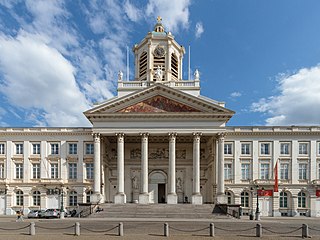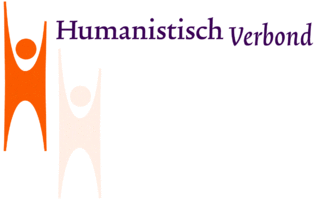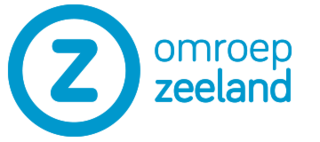Related Research Articles

The Netherlands Armed Forces are the military services of the Kingdom of the Netherlands. The core of the armed forces consists of the four service branches: the Royal Netherlands Navy, the Royal Netherlands Army, the Royal Netherlands Air Force and the Royal Netherlands Marechaussee. The service branches are supplemented by various joint support organisations. In addition, local conscript forces exist on the Dutch Caribbean islands of Aruba (AruMil) and Curaçao (CurMil). These operate under the auspices of the Royal Netherlands Navy and the Netherlands Marine Corps. The armed forces are organisationally part of the Ministry of Defence.

The Royal Army Chaplains' Department (RAChD) is an all-officer department that provides ordained clergy to minister to the British Army.

Brother Dr. René P. E. Stockman, F.C. is the Superior General of the Congregation of the Brothers of Charity since 2000. He is a Belgian specialist in psychiatric caregiving.
The Military ranks of the Netherlands Armed Forces are the military insignia used by the armed forces of the Netherlands.

The European Humanist Federation, officially abbreviated as EHF-FHE, was an umbrella of more than 60 humanist and secularist organisations from 25 European countries.

Uitgeverij Lannoo Groep is a Belgian publishing group, based in Tielt, with assets in Belgium and the Netherlands. Its Belgian subsidiary is Uitgeverij Lannoo. Its Dutch subsidiary is LannooMeulenhoff. Over the years Lannoo evolved from Catholic and Flemish to an open, commercial publishing house.

Boris van der Ham is a Dutch writer, humanist, former politician, and actor. On 23 May 2002, he became a member of the House of Representatives for the Democrats 66 (D66), a social liberal party. From 24 November 2012 to 21 November 2020, he was the president of the Humanistisch Verbond.

Joris in 't Veld was a Dutch politician of the Social Democratic Workers' Party (SDAP) and later the Labour Party (PvdA) and jurist.

The Military Ordinariate of Belgium is a Latin Church military ordinariate of the Catholic Church in Belgium. Immediately exempt to the Holy See, it provides pastoral care to Catholics serving in the Belgian Armed Forces and their families.
Vrijdenkersvereniging De Vrije Gedachte (DVG) (English: Freethinkers association The Free Thought), is a Dutch atheist–humanist association of freethinkers. It was founded in 1856 and known by the name De Dageraad ("The Dawn") before assuming its present name in 1957. De Vrije Gedachte strives to use reason, natural science and logic to liberate humanity from prejudices, clerical paternalism, dogmas and false truths.

Paul Bernard Cliteur is a Dutch professor of jurisprudence at Leiden University, as well as a politician, philosopher, writer, publicist and columnist. He is known for his conservative perspective, his atheism, his republicanism, and his dislike of Islam. He is a member of De Vrije Gedachte. Since 2015, Cliteur is a member of the Dutch political party Forum voor Democratie, where he is chairman of the advisory board and the party's official think tank. In 2019 he was elected to be parliamentary group leader for Forum voor Democratie in the Dutch Senate.

The Humanistisch Verbond is a Dutch association based on secular humanist principles.
Grad Damen is a Dutch professional footballer who plays as a midfielder for Eerste Divisie club TOP Oss.

Omroep Zeeland is a public broadcaster located in Zeeland, Netherlands. Founded in 1988, the media organization is active in television, radio, and internet. The audience is on average slightly older than that of the other Dutch regional broadcasters.
Jan van Raalte is a Dutch football manager of amateur squads and formerly a professional footballer, mostly in the Eerste Divisie and one season with Cambuur Leeuwarden in the Eredivisie. Van Raalte won the Rinus Michels Award for coaching amateur teams. He lives in Harkema where he finished his midfield player career.
Ecotribe Teuge is a collective of people living on a squatted terrain in the Dutch countryside. It is located on the edge of the village of Teuge, in the province of Gelderland. The buildings were constructed by the Nazis and formerly used to house Moluccan soldiers. The site was occupied in 2001, when people began to live there in an off-the-grid and self-sufficient manner. Since 2018, there are plans by the province to develop the terrain.

The Tabakspanden are a group of buildings standing on the Spuistraat in central Amsterdam, adjacent to the Keizerrijk and Wijdesteeg alleyways. Named after a former owner, the speculator Hendrik Tabak, they were mostly squatted from 1983 onwards, although the artist Peter Klashorst also rented an apartment and gallery space. The best known building was Spuistraat 199, known as the Slangenpand (Snakehouse) because of the large mural which covered the front exterior. In 2015, the squatters were evicted and the buildings were mostly demolished prior to redevelopment. The new project is known as De Keizer and has 69 apartments, a restaurant and a gallery. Two of the buildings are registered as rijksmonumenten.

Mardjan Seighali is an Iranian-born Dutch human rights activist, refugee worker and non-profit director. In 2013 Seighali became director of the Stichting voor Vluchteling Studenten UAF. She serves on the Advisory Board of the College voor de Rechten van de Mens, and a member of the Supervisory Board of Het Loo Palace.

The Commander of the Armed Forces is the professional head of the National Army, the military of the Republic of Suriname. The position dates back to the country's independence from the Netherlands in 1975, with the military being named the Surinamese Armed Forces until after the Sergeants' Coup in 1980.

The Oratorian College in Mechelen was a Latin school that was run in the city of Mechelen by the Congregation of the Oratory from 1630 to 1796. Originally founded in the Middle Ages by a collegiate church, management was transferred to the civic magistracy in 1450 and to the Oratorians in 1630. The school was closed down by occupying French revolutionary forces in 1796. The 18th-century building of the Oratorian College is preserved as a listed monument.